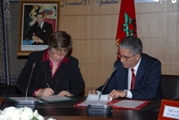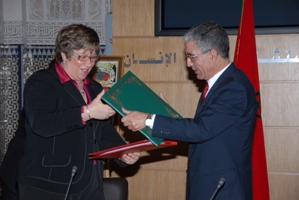Partnership between CCDH and Ministry of Social Development, Family and Solidarity
As part of the implementation of the community reparation program, overseen by the Advisory Council on Human Rights (CCDH), a new partnership agreement was signed on 5 May 2009 with the Ministry of Social Development, Family and solidarity. The objective of this agreement is to support social programs in areas where the community reparation program is being implemented for women, children, persons with disabilities and the elderly, and to contribute to the rehabilitation of associations and capacity building of local actors.
Under this agreement, signed by Mrs. Nouzha Skalli, Minister of Social Development, Family and Solidarity and Mr Ahmed Herzenni, CCDH President, this Ministry is committed to do the following:
- Give a particular importance to regions covered by the community reparation program: Figuig, Errachidia, Zagora, Ouarzazate, Tan Tan, Khemisset, Nador, Khenifra, Hay Mohammadi-Ain Sebaa, Azilal, al-Hoceima, in the programs launched by the Ministry and its institutions;
- Enhance the infrastructure and human resources of the Ministry’s institutions in the regions concerned;
- Support the social projects meant in these regions for women, children, the elderly and persons with disabilities;
- Contribute to supporting associations and to enhancing the capacities of social stakeholders in these regions;
- Contribute to the preservation of the memory by naming some of the Ministry’s institutions in these regions after symbolic figures;
- Draw up programs and awareness raising activities on human rights conventions related to women, children and persons with disabilities;
- Support the projects of local coordination bodies of the community reparation program and conclude partnerships with local social stakeholders;
- Give priority to the communities of the regions concerned in the implementation of the conventions of international cooperation signed between the Ministry and its partners.
Meanwhile, the CCDH undertakes to do the following:
- Draw up proposals and projects in coordination with local coordination bodies and the Steering Committee;
- Mobilize other partners to support the programs outlined;
- Conduct studies and submit proposals on projects likely to promote the regions concerned;
- Collect data and draw up reports on the implementation of various programs;
- Organize training sessions for the executives of the Ministry and its partners in the human rights approach;
- Hold seminars and events in partnership with the Ministry to disseminate the human rights values.

On this occasion, the CCDH President said that this Convention in addition to other agreements signed with various government departments, and national and international institutions, was not limited to the implementation of the community reparation program only, but also aims to include this action in a sustainable development approach. Mr. Herzenni also recalled that all these forms of cooperation are designed to build Morocco of democracy and development.
For her part, Ms. Nouzha Skalli said that the commitment of both parties in favor of the communities concerned will only strengthen the cooperation between the Ministry and the CCDH. Also, she expressed her conviction that the participation of women and men in this process is the guarantee of a new success in the regions covered by the community reparation program, which could become a leading example in terms of socio-economic and cultural development. Ms. Skalli recalled that the approach to involvement and partnership was also that adopted by the National Initiative for Human Development and that Morocco was entering a new phase involving the economic, social, cultural and environmental rights.
It should be noted that the CCDH, as part of the implementation of reparation programs, signed a series of agreements with different partners: the Ministry of Interior, the Ministry of Youth and Sport, the Agency for the Development of eastern Regions, the CDG, a financial group, the European Union, the United Nations Development Fund for Women (UNIFEM), the Ministry of Employment, the Royal Institute for Amazigh Culture, the Ministry of Housing, Town Planning and Development, the Ministry of National Education, Higher Education, Staff Training and Scientific Research, the Development Aagency of the Southern Provinces, the Moroccan Cinematographic Centre (CCM) and the Entraide Nationale.






















